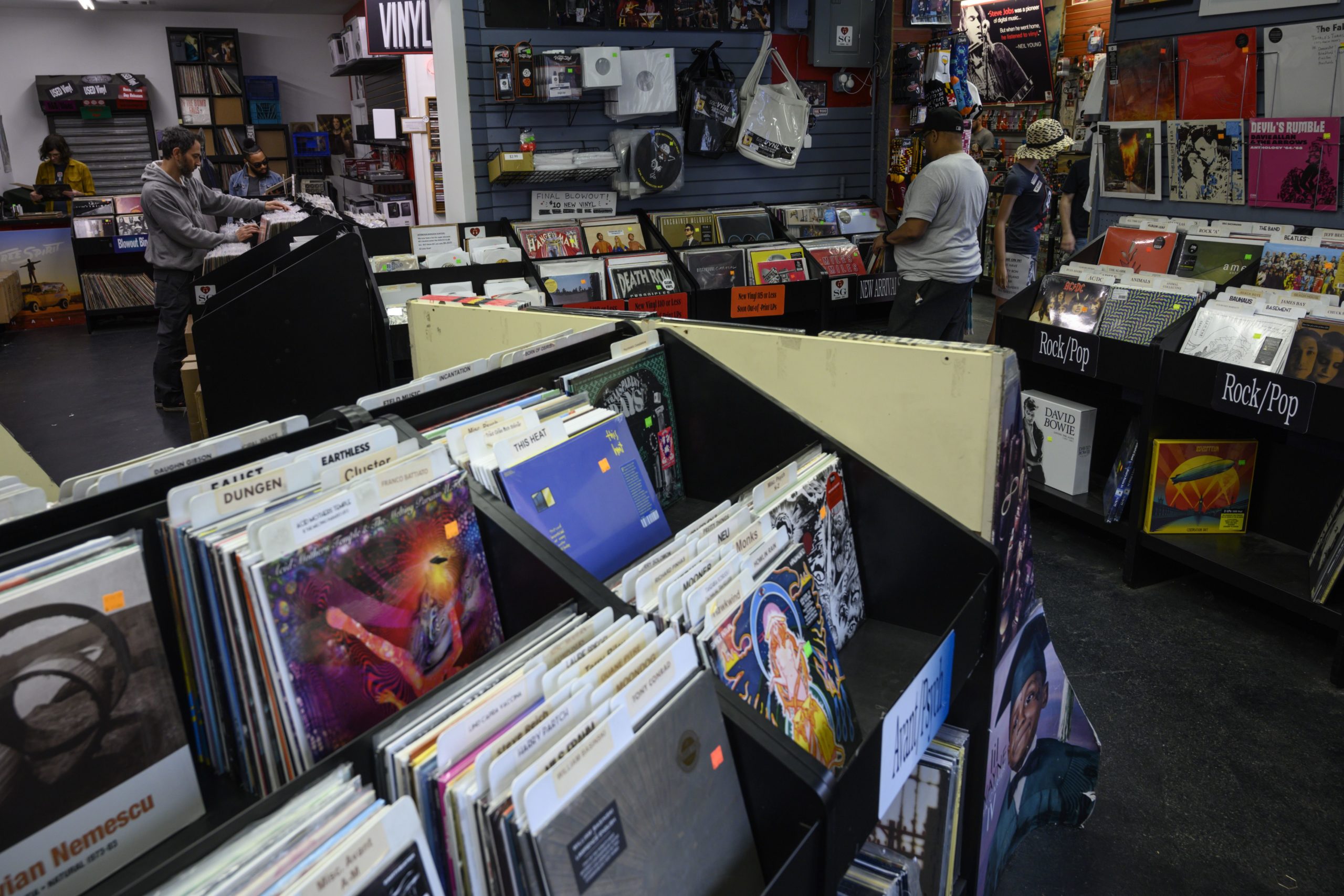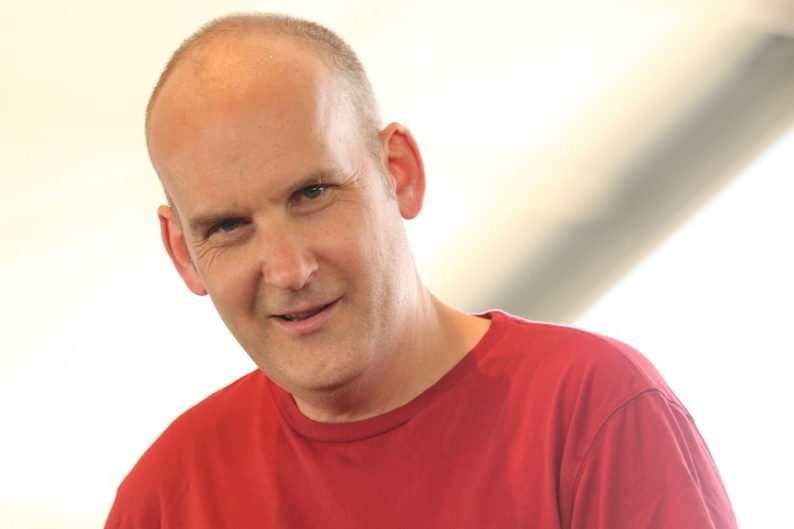Ian MacKaye has been diligently slaving over a massive archive of nearly all of Fugazi’s 1,000-plus live shows over the past four years. So it was understandably difficult for the musician and Dischord Records owner to summarize his relationship with cataloging the past at his 90-minute talk at Washington, D.C.’s Library of Congress last night. The lecture, sponsored by the Library’s National Digital Information Infrastructure and Preservation Program, was billed as a discussion about “personal digital archiving and the need to educate creators and users in ways to steward our digital cultural heritage.” But MacKaye — never one to stick to the status quo (or a set list) — seized the opportunity to talk about, well, just about everything. Here are some of his key quotes:
On Discovering Punk and His Straight-Edge Mentality:
“[In the ’70s] pretty much what I saw were just people getting high. In high school, I loved all my friends, but so many of them were just partying. It was disappointing that that was the only form of rebellion that they could come up with, which was self-destruction.”
On How Skateboarding Shaped His Musical Sensibilities:
“Skateboarding is not a hobby. And it is not a sport. Skateboarding is a way of learning how to redefine the world around you. For most people, when they saw a swimming pool, they thought, ‘Let’s take a swim.’ But I thought, ‘Let’s ride it.’ When they saw the curb or a street, they would think about driving on it. I would think about the texture. I slowly developed the ability to look at the world through totally different means.”
On Playing in the Short-Lived Teen Idles:
“Teen Idles played for a year and then broke up. We saved every dollar we ever made. It was in a cigar box. So, when we broke up, instead of splitting the money between the four of us — each getting two-hundred-and-some dollars — we decided that we would document the music that we had been making. You can imagine, by the way, the interest that record labels across the country had in a teenage punk band from Washington, D.C. that had broken up. There was no interest whatsoever.”

Also Read
10 Vinyl Releases You Need Now
On the Early Days of Dischord Records and Going DIY:
“We had no idea how to make a record, so we just asked one of our friends who put out records at the time, ‘How do we do that?’ And he said, ‘Here’s a phone number, call them.’ So we called National Record Productions down in Nashville, Tennessee, and they said, ‘Send us a tape and a check for $500.’ We got a Money Order, sent it down, and got a thousand 7-inch records. Then we took apart a picture sleeve from a 7-inch record from England to see how it was configured. So you can imagine, a 7″x7″ sleeve — a 14-inch paper with little flaps on the side that pulled in — we just opened it up, we sketched it on a 11″x17″ piece of paper, and then we put our own art into that and took it to a print shop and said: ‘Can you give us a thousand of these?’ The guy ran them off and in a week we picked them up: a thousand 11″x17″ pieces of paper with this weird-shaped art. And then using scissors and glue, we cut and folded every single record sleeve. That is the way Dischord Records worked for the first 10,000 records. By hand, cut-and-folded, every one of those sleeves. That, my friends, is the record industry. The is the true record industry. It was incredible to sit with people — your friends — and make records together. It was an amazing experience.”
On the Beginnings of Dischord Records’ Massive Archive:
“We decided we were going to document something that was profoundly important to us, and that is our scene; the punk scene in Washington, D.C. And that’s how it really began, in terms of ‘The Collection.’ The idea that something important was happening that we were a part of — not important necessarily to the world, but important to us.”
On His Obsession With Archiving Things:
“I think it may be a blood theme here. My grandmother, Dorothy MacKaye, under the name Dorothy Disney, wrote a column for the Ladies’ Home Journal called ‘Can This Marriage Be Saved?’ It was essentially a column where she would interview a man and a woman who were having difficulty in their marriage and then a counselor who would weigh in on their problems. At some point, when cassette tapes came into use, she used to use those to record the conversations. I don’t think used them to listen to — she relied mostly on her shorthand — but she kept the tapes. And I keep coming across boxes of tapes of these people in 1969 and 1970 talking about all the hassles they’re having; how their husbands are balling someone. At some point my grandma made a very strange decision, that she wasn’t just going to tape these interviews with these people, she was just going to tape everything. So I have all these tapes of my grandmother. In one instance it’s of her in the back of a taxi cab, lost, in Los Angeles, screaming at the taxi driver. At one point the driver says: ‘You sound like my father!’ and my grandmother screams back: ‘Well, your father must be very disappointed in you!’ There’s a series of tapes called “Dorothy Works The Phones.” She would tape her phone calls. And I have tapes of my grandmother calling me, when I was 12, driving me crazy! And then our mother also started running tapes. She’d just start running tapes in the house. Like of her playing cards or whatever. There was just something about the documentation of these moments that were really nice, really interesting things. I’m working on digitizing all of these tapes as well.”
On Smartphones and Oversharing:
“I think that people are constantly thinking about capturing things that they’re not actually present for the moment they’re trying to capture. I’m quite sure of this. I think it’s insane how many pictures have to be taken these days. We have to realize there’s a level of documentation that’s just chatter, it’s noise, and beyond that, people who are truly documenting are going to have to find a way to puncture that.”
On the Role of Record Labels:
“Record labels sell plastic. That’s what they sell. They’re not evil, they’re not bad. I have a record label. The plastic they sell has become more attractive to you — or to the buyer — because of the information that has been infused into it. It’s essentially the same as the difference between having a baseball cap that’s blank, or having one that has the Washington Nationals ‘W’ on it. Why you would pay more for the Nationals one is because the hat maker — in theory, at least — is paid to have the rights to put this ‘W’ on the hat.”
On How the Internet Has Impacted the Record Industry:
“They enjoyed a hundred-year monopoly, and then the Internet came along and screwed things up for them. But they’re still trying to figure out how to erect the tollbooths. And they’ll do it, because they’ve got Congress on their side. It’s just for those of us who don’t want to engage in that to figure out how to get around their silly tollbooths.”
On the Fugazi Live Series:
“There’s a lot of these shows. We’ve been working on this for about four years, and we have about 300 shows up — we still have 500 to go. This is an insane project. It involves the digitization of all of the cassettes. Then, those files are mastered and edited, so they’re individual songs. It’s a crazy job. And honestly, the amount of money we put into it — not counting the hours — it’s not making any money. But somewhere down the road, some kid very much like me will be interested in what was happening during this time. Because, most of the time, what was happening in the past has always been curated by the mainstream media industry. They’re the ones that decided about the history of rock.”
On the Problems of Rock Docs:
“If any of you remember that incredibly informative history of rock documentary that was on the PBS channel a number of years ago — in the late ‘90s — it was incredible because the punk chapter starts out showing the Sex Pistols and the Ramones playing…and then straight to Nirvana. A 15-year jump, just like that.”
On File Sharing:
“Every song I ever wrote, I wrote to be heard. So, if I was given a choice that 50 years from now I could either have a dollar or knowing that some kid was listening to my song, I’d go with the kid listening to my song.”
On the Definition of Punk:
“People ask me: ‘What is punk? How do you define punk?’ Here’s how I define punk: It’s a free space. It could be called jazz. It could be called hip-hop. It could be called blues, or rock, or beat. It could be called techno. It’s just a new idea. For me, it was punk rock. That was my entrance to this idea of the new ideas being able to be presented in an environment that wasn’t being dictated by a profit motive.”




